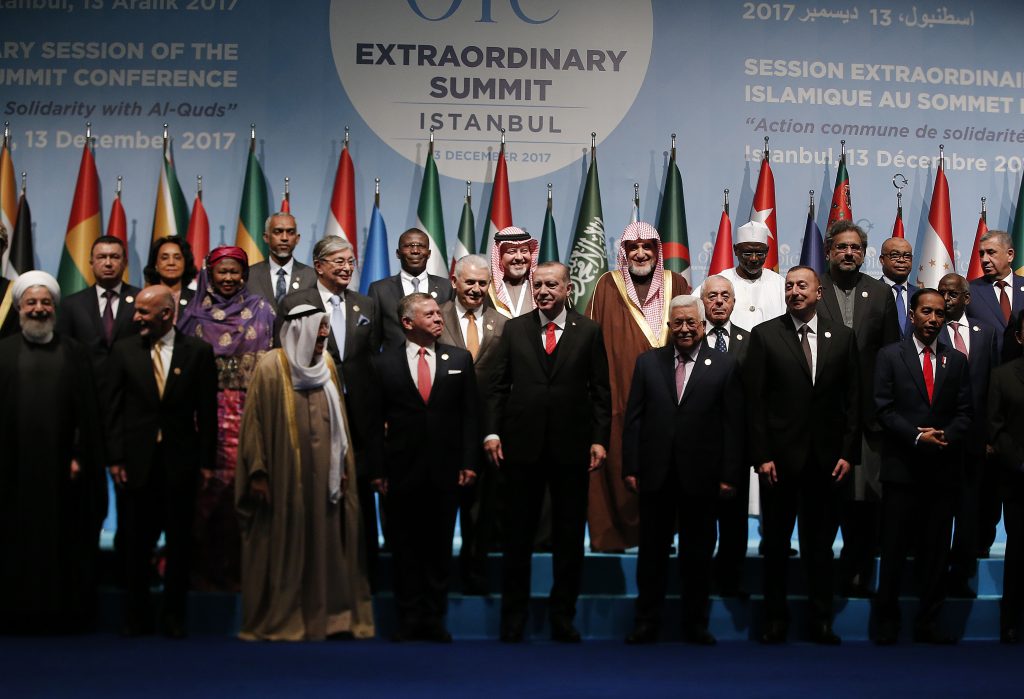
ISTANBUL (AP) — Palestinian President Mahmoud Abbas told Arab and Islamic leaders on Wednesday that the United States is no longer fit to broker an Israeli-Palestinian peace deal and should be replaced as mediator by the United Nations, outlining a significant policy shift in response to President Donald Trump’s recognition of Jerusalem as Israel’s capital.
In an impassionate speech, Abbas said his people will no longer accept the United States as a peace broker but added that they remain committed to international resolutions which have formed the basis of the process.
Abbas was speaking at the gathering of heads of state and top officials from Islamic nations at a summit in Turkey that is expected to forge a unified Muslim world’s stance against Trump’s move.
Abbas said Trump’s decision was a “crime” which came at a time when the Palestinians were engaged with Washington in a new push to reach what he said was anticipated to be the “deal of our times.”
“Instead we got the slap of our times,” Abbas said. “The United States has chosen to lose its qualification as a mediator … We will no longer accept that it has a role in the political process from now.”
The speech marked a significant shift in Abbas’ approach toward the United States, after years of focusing on courting U.S. goodwill because of Washington’s role as sole mediator in the Israeli-Palestinian conflict.
Immediately after Trump’s announcement last week, Abbas had said the U.S. effectively disqualified itself as a broker, but Wednesday’s speech was more sharply worded and delivered to a global audience. It was also part of a speech that called on the gathering for specific steps to counter the U.S. decision on Jerusalem.
“We call that the (peace) process in its entirety be transferred to the United Nations,” Abbas said. He also called on countries that believe in the two-state solutions to recognize Palestine as a state, and urged Arab and Muslim nations to financially support east Jerusalem.
In his over-an-hour-long speech, Abbas also urged Muslim nations and countries with relations with Israel to take necessary political and economic measures against Israel “to force it to abide by international consensus” to end its occupation of Palestinian territories, including east Jerusalem.
Last week, Abbas’ aides said the Palestinian leader would not meet with Mike Pence during the U.S. vice president’s planned visit to Israel and the West Bank next week. Abbas had initially planned to meet with Pence in the biblical West Bank town of Bethlehem, but two senior aides have said the meeting would not take place because of Trump’s pivot on Jerusalem.
The Istanbul gathering of heads of state and top officials from the 57-member Organization of Islamic Cooperation was also an opportunity for the Muslim world to offer its strongest response yet to Washington’s move.
Turkish President Recep Tayyip Erdogan— the current president of the OIC — called on countries to urgently recognize the Palestinian state and Jerusalem as its capital.
Erdogan has been among the most vocal critics of Trump’s announcement. In remarks to the summit, he said Israel is an “occupying state” and a “terror state.”
Jerusalem’s status is at the core of the decades-long Israeli-Palestinian conflict and Trump’s Dec. 6 announcement was widely perceived as siding with Israel. It also raised fears of more bloodshed as past crises over Jerusalem had triggered violent outbreaks.
King Abdullah II of Jordan told the gathering that the Trump decision was “grave”, threatening the resumption of any peace talks.
Earlier, in opening remarks to a pre-summit meeting, Turkey’s foreign minister, Mevlut Cavusoglu, told OIC foreign ministers that the U.S. decision aims to “legitimize Israel’s attempt to occupy Jerusalem.”
“They expect the Islamic nation to remain silent,” he said. “But we will never be silent. This bullying eliminates the possibility of peace and the grounds for shared life. The U.S.’ decision is null for us.”
Most countries around the world have not recognized Israel’s 1967 annexation of east Jerusalem. Under a long-standing international consensus, the fate of the city is to be determined in negotiations.
Iranian President Hassan Rouhani, Lebanon’s President Michel Aoun, and top ministers of numerous nations were also attending the gathering in Istanbul.
The secretary general of OIC called on countries that have not recognized Palestine as a state to do so. Yousef bin Ahmad Al-Othaimeen told the summit the U.S. decision on Jerusalem is “an exceptional challenge” facing Muslim nations and that it will fan violence in the region, giving extremists an excuse to sow chaos.
In an emergency meeting in Cairo last weekend, Arab League foreign ministers demanded that the U.S. rescind Trump’s decision. In a resolution long on rhetoric but short on concrete actions, the ministers also called for the U.N. Security Council to adopt a resolution condemning Trump’s decision, but acknowledged that Washington would most likely veto it.
Israel has considered Jerusalem its capital since the state’s establishment in 1948 and sees the city as the ancient capital of the Jewish people. In the 1967 Mideast war, Israel captured the city’s eastern sector and later annexed it in a move that is not recognized internationally.
The Palestinians equally lay claim to Jerusalem and want the eastern part of the city as capital of their future state. Some 320,000 Palestinians live in that part of the city and Palestinians claim a deep cultural, historical and religious connection to the city.
The Old City, located in east Jerusalem, is home to sites holy to Jews, Christians and Muslims. These include the Western Wall, the holiest site where Jews can pray, and the Al-Aqsa Mosque, Islam’s third holiest site.




